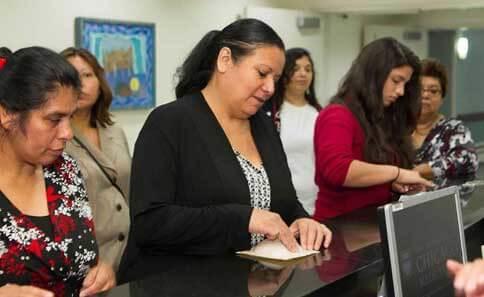Special Spotlight: World Cancer Day - Ending Cancer Health Disparities is Not Beyond Us
, by CRCHD staff
Today is World Cancer Day and CRCHD joins the global fight against cancer and cancer health disparities so that everyone can live healthy lives.
In many parts of the U.S., some population groups experience an unequal burden of cancer. In areas like the Deep South, Appalachia, and the Great Lakes region for example, members of members of racially and ethnically diverse groups often face great barriers to health care access. Cancer health disparities are a result of a complex set of factors. Poverty can be to blame, as well as environmental and lifestyle risks, but another is simply a lack of cancer information.
Through NCI/CRCHD’s National Outreach Network, community health educators (CHEs) are helping to inform local communities about cancer and identifying disparity issues that are unique to specific populations. Through public health fairs, developing and sharing culturally-appropriate and in-language cancer resources, and informing people about the importance of cancer screenings and adopting healthy lifestyles, our CHEs are helping all people have access to quality, effective cancer care.
In the Chicago area (where there is high rate of poverty, unemployment, low education, and a high disease burden), CHEs Lisa Hinton and Helen Lam at the University of Chicago Medicine Comprehensive Cancer Center (UCCCC) are educating African American, Chinese American and Hispanic/Latina women about breast cancer, and encouraging them to get screened. Though more non-Hispanic white women are diagnosed with breast cancer, more African American and Hispanic/Latina women die from the disease.
Hinton and Lam helped launch an interactive lecture series called “A Walk Through the Cure” where women met physicians and breast cancer survivors and had the opportunity to ask questions and share experiences. The program was adapted culturally and linguistically to help influence behavior change (in this case, to agree to get screened).
The early detection program, in collaboration with the efforts from the University of Chicago Urban Health Initiative’s Illinois Breast and Cervical Cancer Program (IBCCP) was a success. In 2011, the mammography rate of women who participated in the University of Chicago Medicine’s IBCCP program jumped to 50 percent from 15 percent in 2010. And by 2014, the program reported an increased mammography rate of more than 100 percent. Moreover, since 2007, there has been a 35% decrease in cancer mortality, which translates to 25 lives saved annually in Chicago (Metropolitan Breast Cancer Task Force).
The sustainment of outreach initiatives like these can be challenging, but it is not out of reach. Hinton’s vision of the future is one that “reflects health equity and social justice for all marginalized populations.” We believe we can get there – one community at a time.
